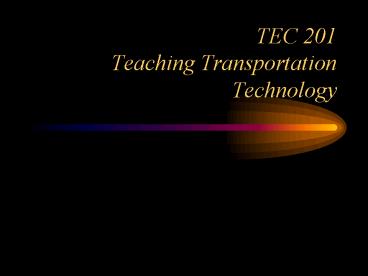TEC 201 Teaching Transportation Technology - PowerPoint PPT Presentation
1 / 25
Title:
TEC 201 Teaching Transportation Technology
Description:
TEC 201 Teaching Transportation Technology The meaning of the word Transport. The word transport means to carry across. It is borrowed from the Latin ... – PowerPoint PPT presentation
Number of Views:120
Avg rating:3.0/5.0
Title: TEC 201 Teaching Transportation Technology
1
TEC 201Teaching Transportation Technology
2
The meaning of the word Transport.
- The word transport means to carry across. It
is borrowed from the Latin language. - Porto in Latin means to carry.
- Trans means across.
3
Transportation is a dynamic part of the American
economy
- Transportation accounts for about 20 of the
gross national product. - 25 of all jobs in the U.S. are related to
transportation technology.
4
Transportation Statistics
- Over 87 billion spent on goods and services
related to the automobile - 8 million factory sales of the automobile each
year - Over 91 billion spent each year on gasoline
- Over 1.8 trillion passenger miles transported by
auto, airplane, bus, and rail.
5
Negative Impacts
- 18 million auto accidents each year
- 1.8 million injuries from auto accidents
- 50,000 fatalities each year from auto accidents
- Causes 50 of all air pollution
- 42 of all energy used in US for transportation.
6
Transportation is
- The physical movement of people and goods between
points - Interrelated to communications, production, and
energy technologies - Has increased the standard of living
- Has increased leisure time activities.
7
The Transportation System in the United States
consists of
- 4 million miles of roads
- 120 million cars
- 200,000 miles of rail track
- 500,000 miles of oil and gas pipeline
- 30 million trucks.
- Do we need to spend more money on repairing old
systems than on building new ones?
8
History of Transportation
- Development can be traced to these four methods
of power - Animal Power
- Wind and Water Power
- Engine Power
- Rocket Power
9
History of Transportation
- Significant innovations that help spur on the
development of transportation - Horse Harnesses/saddles
- Canals
- Advances in ship building
- Steam Engines
- Development of steel products
- Communications technology
- Engine designs (gasoline, diesel, turbine)
10
History of Transportation
- Railroads
- Automobiles
- Paradigm Shifts and Significant Events
11
Railroads
- They were especially important to the growth in
the 19th Century. They made it possible to move
people to the expanding West and move products to
markets. - Determined the location (or relocation) of many
cities.
12
Automobiles
- Have changed many lifestyles
- Led to the development of suburbs
- Led to the decline of small towns
- Have become an extension of the human body. In
many cases, one can determine much about a person
by their automobile.
13
Paradigm Shifts and Significant Events
- Wheel was developed about 4,000 BC by Sumerians
- Chariot was introduced in Egypt in 1470 BC by
conquering the Hykses - 1770, Cugnot steam traction enginemajor
milestone for the automobile - 1776 James Watts Steam Enginewas eventually used
for pumping water, cotton mills, saw mills,
rolling mills - George Washington for his inaugural in 1789 there
were no hard surface roads
14
Continued
- The first federally built highway was the
National Road from Baltimore to Vandalia, IL - 1783, the first hot air balloon flight took
place - Robert Fultons Clermont, steam powered boat,
offered service on the Hudson River - 1827, the first successful rail line in America,
the Baltimore and Ohio, was chartered - 1860, Etienne Lenoir develops internal combustion
engine - 1869, the last spike was driven into the
transcontinental railroad
15
Continued
- 1886, Carl Benz was credited with the worlds
first practical motorcar - 1893, Henry Ford build his first car
- 1897, Rudolf Diesel developed the diesel engine
- By 1900 there were over 1000 auto manufacturers
worldwide - 1903, Wright Brothers made first flight lasted
12 seconds - 1908, Model T appears
16
Continued
- 1926, Goddard launches his first rocket
- 1934, Queen Mary was built weights 81,500 tons
- 1939, Igor Sikorsky invents first helicopter
- 1957, Sputnik Russian First Satellite
- 1961, Russians put first man in orbit
- 1969, U.S. lands on the moon
- 1981, first reusable space transportation vehicle
(Space Shuttle)
17
Systems Approach
- Input
- Process
- Output
- Feedback
18
Transportation Systems
- Inputs Those resources needed to begin the
system. - People
- Capital
- Knowledge
- Materials
- Energy
- Time
- Finance
19
Transportation Systems
- Processes The action part of the system. For
example, when baking cookies, the process is the
mixing of the ingredients. In transportation,
process is usually the result of management. - Production
- Management
- Action
- Movement of Cargo
- Movement of People
20
Transportation Systems
- Outputs The end result or output is a result of
the inputs and processes. The output is the
relocation of people and cargo. Transportation
also has unintended outputs like pollution,
noise, etc. - End Results
- Relocating People
- Relocating Cargo
21
Transportation Systems
- Feedback Provides information on how the system
is working. - Monitoring
- Adjusting
- Correcting
22
Transportation Systems
- Goals of a System The success of any system
involves the achievement of desirable goals. For
example, in commercial air transportation, the
goal might be getting people to their destination
on time and safely.
23
Four Basic Forms (Laws)
Land
Air
Water
Space
Rail Highway Pipeline Recreational On-site
Heavier-than-air Lighter-than-air
Inland Trans-ocean
Manned Unmanned
Intermodal Transportation
24
Some are overlooked
- Escalators
- Pipelines
- Elevators
- Are all forms of transportation.
25
Why Study Transportation?
- Is essential in nearly everything we do
- It affects the way we live
- Without it, travel and the movement of goods
would not be possible.































